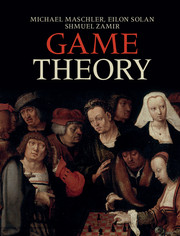Book contents
- Frontmatter
- Contents
- Acknowledgments
- Notations
- Introduction
- 1 The game of chess
- 2 Utility theory
- 3 Extensive-form games
- 4 Strategic-form games
- 5 Mixed strategies
- 6 Behavior strategies and Kuhn's Theorem
- 7 Equilibrium refinements
- 8 Correlated equilibria
- 9 Games with incomplete information and common priors
- 10 Games with incomplete information: the general model
- 11 The universal belief space
- 12 Auctions
- 13 Repeated games
- 14 Repeated games with vector payoffs
- 15 Bargaining games
- 16 Coalitional games with transferable utility
- 17 The core
- 18 The Shapley value
- 19 The bargaining set
- 20 The nucleolus
- 21 Social choice
- 22 Stable matching
- 23 Appendices
- References
- Index
20 - The nucleolus
- Frontmatter
- Contents
- Acknowledgments
- Notations
- Introduction
- 1 The game of chess
- 2 Utility theory
- 3 Extensive-form games
- 4 Strategic-form games
- 5 Mixed strategies
- 6 Behavior strategies and Kuhn's Theorem
- 7 Equilibrium refinements
- 8 Correlated equilibria
- 9 Games with incomplete information and common priors
- 10 Games with incomplete information: the general model
- 11 The universal belief space
- 12 Auctions
- 13 Repeated games
- 14 Repeated games with vector payoffs
- 15 Bargaining games
- 16 Coalitional games with transferable utility
- 17 The core
- 18 The Shapley value
- 19 The bargaining set
- 20 The nucleolus
- 21 Social choice
- 22 Stable matching
- 23 Appendices
- References
- Index
Summary
Chapter summary
This chapter is devoted to the study of the nucleolus, which is, like the Shapley value, a single-point solution concept for coalitional games. The notion that underlies the nucleolus is that of excess: the excess of a coalition at a vector x in ℝN is the difference between the worth of the coalition and the total amount that the members of the coalition receive according to x. When the excess is positive, the members of the coalition are not content with the total amount that they together receive at x, which is less than the worth of the coalition. Each vector x in ℝN corresponds to a vector of 2N excesses of all coalitions. The nucleolus of a coalitional game relative to a set of vectors in ℝN consists of the vectors in that set whose vector of excesses are minimal in the lexicographic order. It is proved that the nucleolus relative to any compact set is nonempty and if the set is also convex, then the nucleolus relative to that set consists of a single vector.
The nucleolus of the game is the nucleolus relative to the set of imputations, that is, the set of efficient and individually rational vectors. The prenucleolus of a coalitional game is its nucleolus relative to the set of preimputations, that is, the set of all efficient vectors. Both the nucleolus and the prenucleolus are defined for any coalition structure.
Information
- Type
- Chapter
- Information
- Game Theory , pp. 801 - 852Publisher: Cambridge University PressPrint publication year: 2013
